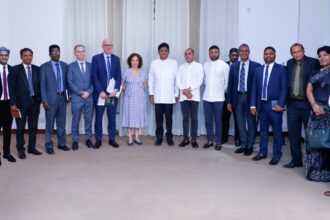As tensions rise between two nuclear-armed states, the European Union can no longer afford to remain passive, writes Gauri Khandekar, a researcher at the Brussels School of Governance, VUB
India and Pakistan are facing their most serious diplomatic and military crisis in years, triggered by a terrorist attack on 22 April in Indian-administered Kashmir, where gunmen killed Hindu tourists in Pahalgam.
India blames the Pakistan-based group Lashkar-e-Taiba and its offshoot, The Resistance Front, for the assault. With both countries expelling diplomats, suspending the Indus Waters Treaty, and closing land borders and airspace, the situation reflects a dangerous breakdown in ties—and underscores Pakistan’s ongoing role in supporting cross-border terrorism. These attacks are not isolated incidents, but seen by India, are part of a broader strategy by Islamabad to destabilise the region. As tensions rise between two nuclear-armed states, the European Union can no longer afford to remain passive.
The EU, which has long championed democracy and human rights, must confront the limits of its current engagement with Pakistan. Despite years of generous aid and trade privileges, the bloc has failed to stem the rise of extremism and repression in the country. A strategic recalibration is long overdue—one grounded in principled realism and informed by the growing risks of inaction.
Aid without accountability
Since 2014, the EU provided Pakistan over €700 million in in development assistance, along with humanitarian aid. It also grants Pakistan preferential trade access under the GSP+ scheme, allowing duty-free entry for over 80% of its exports—amounting to €7.4 billion in 2022 alone or nearly 30% of its total exports In return, Pakistan committed to implementing 27 international conventions on human rights, labor, the environment, and governance.
But this partnership has failed to deliver. Corruption remains rampant, with Pakistan ranking 140th in Transparency International’s 2022 Corruption Perceptions Index. Political repression has intensified: opposition figures like former Prime Minister Imran Khan are jailed under dubious charges, while dissent is crushed through force. Reports of EU funds being diverted to religious seminaries (madrassas) promoting extremist ideologies further undermine the bloc’s goals. In areas like women’s education and empowerment, progress has been minimal—despite targeted EU support.
A broader pattern of state-sponsored violence
The Pahalgam attack reflects a broader pattern of state-sponsored violence. Pakistan’s military openly endorses religious extremism as a policy tool. Recent remarks by Army Chief Asim Munir, who claimed Hindus and Muslims “differ in every aspect of life,” illustrate the ideological foundation for jihadist proxy warfare.
This external aggression often serves to distract from Pakistan’s deepening internal unrest. In Balochistan and Khyber Pakhtunkhwa, communities are rising up against decades of military oppression, enforced disappearances, and extrajudicial killings. Rather than address domestic grievances, the state continues to export violence—Kashmir being the most frequent outlet.
A history of deception
Pakistan’s duplicity is well-documented. Osama bin Laden lived for years undetected in Abbottabad, just meters from a major military academy—underscoring the security establishment’s long-standing ties with jihadist networks. Continued EU support under these circumstances risks enabling terrorism rather than containing it. Brussels must ask whether its financial and political backing aligns with its foundational values—or whether it is being misused by a rogue regime.
The situation within Pakistan is equally dire. The misuse of blasphemy laws, which carry the death penalty, has led to mass persecution—particularly of religious minorities. Between 1987 and 2021, over 1,900 people were accused, often on fabricated charges. These laws remain incompatible with international norms yet deeply entrenched in Pakistan’s legal framework.
Women’s rights are similarly abysmal. Pakistan ranks 145th out of 146 countries in the World Economic Forum’s 2023 Global Gender Gap Index. Honor killings, forced marriages, and gender-based violence remain widespread. Despite targeted EU funding, little progress has been made—raising serious questions about the impact and oversight of EU aid.
Time for a principled response
The EU-Pakistan relationship stands at a critical juncture. By continuing trade privileges and aid without demanding reform, the EU sends the message that economic interests outweigh core values. The GSP+ scheme, meant to incentivize progress, now enables systemic abuse and undermines the EU’s credibility.
A principled approach is needed—not to abandon Pakistan, but to hold it to the same standards as other partners. EU support must be conditioned on verifiable progress in human rights, governance, and the rule of law, with transparent monitoring mechanisms guiding aid. The EU should also strengthen its engagement with civil society, independent media, and human rights defenders in Pakistan, who represent the country’s best hope for reform.
Continuing the current approach risks further destabilizing South Asia and undermining the EU’s strategic interests. A values-driven policy is crucial to support meaningful reform, safeguard EU interests, and help prevent conflict between nuclear powers. (EU Alive)
The post Kashmir attack : a call for the EU to reassess its Pakistan policy appeared first on Newswire.



